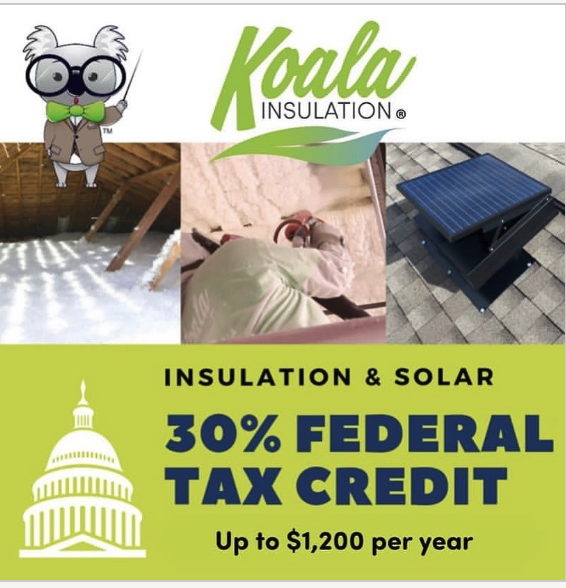Unlock Savings with the Inflation Reduction Act: How Insulation & Solar Attic Fans Could Boost Your Home’s Efficiency

With energy costs creeping up and the growing focus on sustainability, homeowners everywhere are looking for ways to make their homes more energy-efficient without breaking the bank. If you’ve been thinking about improving your home’s insulation to save on heating and cooling costs, the Inflation Reduction Act (IRA) could be just what you need. While we can’t guarantee savings, there’s a good chance you could qualify for tax credits or rebates under this program, making your home more comfortable and energy efficient.
What Is the Inflation Reduction Act?
The IRA is a federal law designed to encourage energy efficiency improvements among homeowners by offering financial incentives. Whether you’re upgrading your insulation, adding a solar attic fan, or making other eco-friendly changes, you could qualify for credits or rebates that make these improvements more affordable.
The Energy Efficient Home Improvement Credit
One of the most exciting benefits of the IRA is the Energy Efficient Home Improvement Credit, which could cover up to 30% of your qualifying project costs—including insulation upgrades—with a yearly limit of $1,200. For example, if you decide to upgrade your home’s insulation to help keep it cooler in summer and warmer in winter, you could potentially recoup a portion of those costs come tax time.
Highlights:
- Annual limit: $1,200
- Up to 30% of qualifying energy efficiency projects
- Includes insulation improvements like the ones Koala Insulation provides
But here’s a bonus! If you’re considering adding a solar attic fan, you could qualify for the same 30% tax credit—without any annual limit. Solar attic fans not only reduce heat buildup in your attic, helping your home stay cooler, but they’re powered by renewable energy, which means you save on electricity too. By taking advantage of this credit, you could enjoy energy savings year-round while also making your home more eco-friendly.
Home Energy Savings Rebate Program
If you’re ready to go big on energy-saving improvements, the Home Energy Savings Rebate Program offers even larger rebates for more extensive projects. Depending on the scale of your upgrade, you could receive rebates between $2,000 and $4,000.
Whether you’re adding insulation to your attic or upgrading to more advanced insulation materials like spray foam, this program could significantly reduce your costs. And remember, these rebates are open to most homeowners—so if you’ve been on the fence about upgrading, now might be the perfect time to explore your options.
High-Efficiency Electric Home Rebate Program
If your family’s income qualifies, you may also be eligible for the High-Efficiency Electric Home Rebate Program, which offers up to $1,600 for families at or below 150% of your area’s median income. Whether you live in a single-family or multi-family home, this rebate could help cover insulation improvements that make a big difference in your home’s comfort and energy efficiency.
How to Find Rebates in Your Area
Rebate availability and amounts can vary depending on where you live, so it’s important to check out what’s available in your state. You can use resources like the ENERGY STAR Rebate Finder or DSIREusa.org to find the rebates you could qualify for. Just enter your zip code, filter by insulation products, and see what options you have to save.
How Koala Insulation Can Help
Upgrading your insulation not only improves your home’s energy efficiency, but it could also qualify you for some of these fantastic rebates and credits under the IRA. At Koala Insulation, we specialize in making homes more energy-efficient and comfortable year-round. Our team can assess your home and help you navigate the options for maximizing energy savings.
How Energy-Efficient Insulation Saves Money
When you invest in energy-efficient insulation, you’re not just making your home more comfortable—you’re also taking steps to lower your energy bills.
Here’s how insulation works to save you money over time:
- Improves Thermal Performance:
Insulation acts as a barrier, helping to keep the heat inside your home during the winter and outside during the summer. By preventing conditioned air from escaping, your home stays warmer in the winter and cooler in the summer, which means your heating and cooling systems don’t have to work as hard to maintain the temperature you want.
- Reduces HVAC Strain:
With proper insulation, your furnace and air conditioner won’t need to run as often or as long to keep your home at a comfortable temperature. This reduced strain not only lowers your energy consumption but also extends the lifespan of your HVAC system, potentially saving you on costly repairs or replacements down the road.
- Maximizes Energy Savings:
According to the U.S. Department of Energy, homeowners can save up to 15% on heating and cooling costs by upgrading insulation in attics, crawl spaces, and exterior walls. Depending on where you live and the type of insulation you choose, these savings could be even higher. Plus, with the financial incentives from the IRA, you could offset a portion of your upgrade costs.
- Helps Avoid Energy Waste:
Insulation reduces the amount of energy that’s wasted through air leaks and poor thermal performance. When you waste less energy, your home becomes more efficient, and you spend less on utility bills each month—giving you a better return on your investment over time.
By improving your home’s insulation, you could not only qualify for IRA rebates but also see significant savings on your energy bills. It’s a win-win for both your wallet and the environment.
Ready to explore how the IRA can help you save on energy-efficient insulation upgrades? Contact Koala Insulation today to schedule your free consultation. We’ll guide you through your options, recommend the best solutions for your home, and make sure you get the most out of available rebates. Visit our website or call us at 877-87-KOALA to get started!
*Restrictions do apply, this does not offer legal or financial advice. Consult with qualified advisors.
Find Your Location


Get a quote


